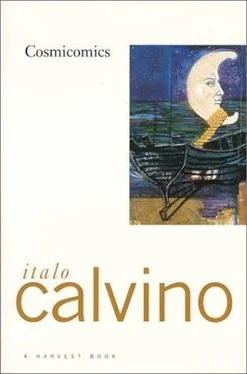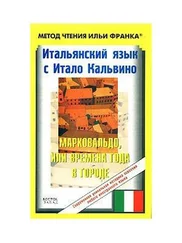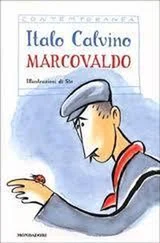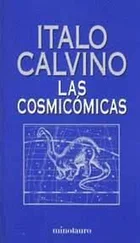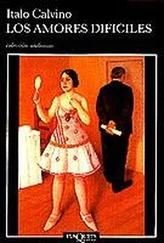My point of reference was always Ursula and, in fact, a certain way she had of proceeding as if twisting could make more familiar the idea that our fall was like a winding and unwinding in a sort of spiral that tightened and then loosened. However, Ursula – if you watched her carefully – wound first in one direction, then in the other, so the pattern we were tracing was more complicated. The universe, therefore, had to be considered not a crude swelling placed there like a turnip, but as an angular, pointed figure where every dent or bulge or facet corresponded to other cavities and projections and notchings of space and of the lines we followed. This, however, was still a schematic image, as if we were dealing with a smooth-walled solid, a compenetration of polyhedrons, a cluster of crystals; in reality the space in which we moved was all battlemented and perforated, with spires and pinnacles which spread out on every side, with cupolas and balustrades and peristyles, with rose windows, with double- and triple-arched fenestrations, and while we felt we were plunging straight down, in reality we were racing along the edge of moldings and invisible friezes, like ants who, crossing a city, follow itineraries traced not on the street cobbles but along walls and ceilings and cornices and chandeliers. Now if I say city it amounts to suggesting figures that are, in some way, regular, with right angles and symmetrical proportions, whereas instead, we should always bear in mind how space breaks up around every cherry tree and every leaf of every bough that moves in the wind, and at every indentation of the edge of every leaf, and also it forms along every vein of the leaf, and on the network of veins inside the leaf, and on the piercings made every moment by the riddling arrows of light, all printed in negative in the dough of the void, so that there is nothing now that does not leave its print, every possible print of every possible thing, and together every transformation of these prints, instant by instant, so the pimple growing on a caliph's nose or the soap bubble resting on a laundress's bosom changes the general form of space in all its dimensions.
All I had to do was understand that space was made in this way and I realized there were certain soft cavities hollowed in it as welcoming as hammocks where I could lie joined with Ursula H'x, the two of us swaying together, biting each other in turn along all our persons. The properties of space, in fact, were such that one parallel went one way, and another in another way: I for example was plunging within a tortuous cavern while Ursula H'x was being sucked along a passage communicating with that same cavern so that we found ourselves rolling together on a lawn of algae in a kind of subspatial island, writhing, she and I, in every pose, upright and capsized, until all of a sudden our two straight lines resumed their distance, the same as always, and each continued on its own as if nothing had happened.
The grain of space was porous and broken with crevasses and dunes. If I looked carefully, I could observe when Lieutenant Fenimore's course passed through the bed of a narrow, winding canyon; then I placed myself on the top of a cliff and, at just the right moment, I hurled myself down on him, careful to strike him on the cervical vertebrae with my full weight. The bottom of such precipices in the void was stony as the bed of a dried-up stream, and Lieutenant Fenimore, sinking to the ground, remained with his head stuck between two spurs of rock; I pressed one knee into his stomach, but he meanwhile was crushing my knuckles against a cactus's thorns – or the back of a porcupine? (spikes, in any case, of the kind corresponding to certain sharp contractions of space) – to prevent me from grabbing the pistol I had kicked from his hand. I don't know how I happened, a moment later, to find myself with my head thrust into the stifling granulosity of the strata where space gives way, crumbling like sand; I spat, blinded and dazed; Fenimore had managed to collect his pistol; a bullet whistled past my ear, ricocheting off a proliferation of the void that rose in the shape of an anthill. And I fell upon him, my hands at his throat, to strangle hun, but my hands slammed against each other with a "plop!": our paths had become parallel again, and Lieutenant Fenimore and I were descending, maintaining our customary distance, ostentatiously turning our backs on each other, like two people who pretend they have never met, haven't even seen each other before.
What you might consider straight, one-dimensional lines were similar, in effect, to lines of handwriting made on a white page by a pen that shifts words and fragments of sentences from one line to another, with insertions and cross-references, in the haste to finish an exposition which has gone through successive, approximate drafts, always unsatisfactory; and so we pursued each other, Lieutenant Fenimore and I, hiding behind the loops of the l' s, especially the l 's of the word "parallel," in order to shoot and take cover from the bullets and pretend to be dead and wait, say, till Fenimore went past in order to trip him up and drag him by his feet, slamming his chin against the bottoms of the v 's and the u 's and the m 's and the n 's which, written all evenly in an italic hand, became a bumpy succession of holes in the pavement (for example, in the expression "unmeasurable universe"), leaving him stretched out in a place all trampled with erasings and x-ings, then standing up there again, stained with clotted ink, to run toward Ursula H'x, who was trying to act sly, slipping behind the tails of the f which trail off until they become wisps, but I could seize her by the hair and bend her against a d or a t just as I write them now, in haste, bent, so you can recline against them, then we might dig a niche for ourselves down in a g, in the g of "big," a subterranean den which can be adapted as we choose to our dimensions, being made more cozy and almost invisible or else arranged more horizontally so you can stretch out in it. Whereas naturally the same lines, rather than remain series of letters and words, can easily be drawn out in their black thread and unwound in continuous, parallel, straight lines which mean nothing beyond themselves in their constant flow, never meeting, just as we never meet in our constant fall: I, Ursula H'x, Lieutenant Fenimore, and all the others.
The more distant a galaxy is, the more swiftly it moves away from us. A galaxy located at ten billion light-years from us would have a speed of recession equal to the speed of light, three hundred thousand kilometers per second. The "quasi-stars" recently discovered are already approaching this threshold.
One night I was, as usual, observing the sky with my telescope. I noticed that a sign was hanging from a galaxy a hundred million light-years away. On it was written: I SAW YOU. I made a quick calculation: the galaxy's light had taken a hundred million years to reach me, and since they saw up there what was taking place here a hundred million years later, the moment when they had seen me must date back two hundred million years.
Even before I checked my diary to see what I had been doing that day, I was seized by a ghastly presentiment: exactly two hundred million years before, not a day more nor a day less, something had happened to me that I had always tried to hide. I had hoped that with the passage of time the episode had been completely forgotten; it was in sharp contrast – at least, so it seemed to me – with my customary behavior before and after that date: so, if ever anybody wanted to dig up that business again, I was ready to deny it quite calmly, and not only because it would have been impossible to furnish proof, but also because an action determined by such exceptional conditions – even if it was really verified – was so improbable that it could be considered untrue in all good faith, even by me. Instead, from a distant celestial body, here was somebody who had seen me, and the story was cropping up again, now of all times.
Читать дальше
